The Vatican issued a 20-page declaration called “Infinite Dignity,” declaring gender-affirming surgery, surrogacy, abortion, and euthanasia as grave violations of human dignity. The document reasserts the Vatican’s rejection of “gender theory” and the idea that one’s biological sex can change. The Vatican emphasized the uniqueness and dignity of each individual received from the moment of conception, suggesting that any sex-change intervention risks threatening that dignity. The document distinguished between gender-affirming surgeries and genital abnormalities present at birth or that develop later, indicating that only the latter can be “resolved” with the help of healthcare professionals.
Advocates for LGBTQ+ Catholics criticized the Vatican’s declaration as outdated, harmful, and contrary to the goal of recognizing the infinite dignity of all of God’s children. They raised concerns that the document could fuel anti-trans violence and discrimination, noting that while it calls for the respect, honor, and love of all humans, it fails to apply this principle to gender-diverse individuals. The document was met with disappointment and criticism from LGBTQ+ advocates who believe it does not align with the Pope’s message of welcoming trans people into the church.
The Vatican’s new document on gender and human dignity aimed to strike a balance between conservative and progressive views within the Catholic Church. While reiterating the church’s rejection of “gender ideology,” the document also denounces the criminalization of homosexuality in some countries, echoing Pope Francis’ stance that being homosexual is not a crime. The document’s author, Argentine Cardinal Víctor Manuel Fernández, emphasized the importance of recognizing the dignity of all individuals while expressing concerns about the fluidity of gender, which may impoverish the vision of man and woman coming together to create new life.
The Vatican’s declaration also addressed surrogacy, stating that it violates the dignity of both the surrogate mother and the child. The document emphasized the child’s right to have a fully human origin and receive the gift of life in a way that respects the dignity of both the giver and the receiver. The Vatican’s position on surrogacy reflects its broader stance on issues related to the sanctity of human life and the importance of upholding human dignity in all aspects of reproductive ethics.
Critics of the Vatican’s document pointed out the lack of consultation with real trans people and the absence of their voices and experiences in the discussion on gender-affirming health care. Transgender activists expressed disappointment and frustration with the Vatican’s stance, particularly in its distinction between gender-affirming surgeries and surgeries on intersex people. They called the document hurtful and dangerously ignorant, highlighting the positive assessment of interventions on intersex people while rejecting gender-affirming health care that has saved many trans individuals’ lives.
The Vatican’s document comes at a time of increased backlash against transgender individuals, including legislative efforts to restrict medical care for trans youths in some US states. Critics argue that the Church’s refusal to recognize the beauty of creation in transgender individuals’ biographies contributes to the rising hostility and challenges faced by these communities. The document’s release has sparked debate and criticism within the LGBTQ+ community and beyond, reflecting broader societal tensions around issues of gender, sexuality, and human dignity. Despite the Vatican’s efforts to uphold its traditional teachings on gender and reproduction, the document has faced strong opposition from advocates seeking greater inclusion and acceptance within the Catholic Church.


